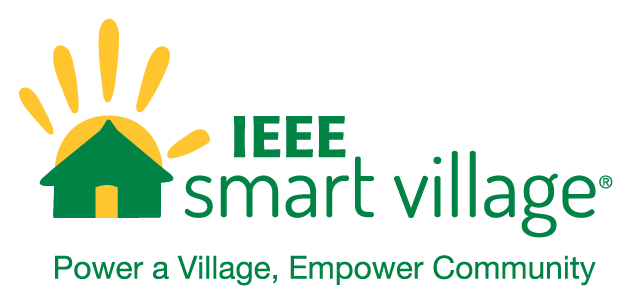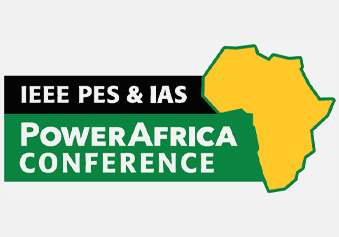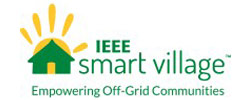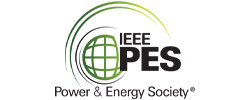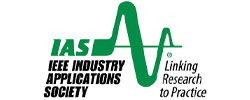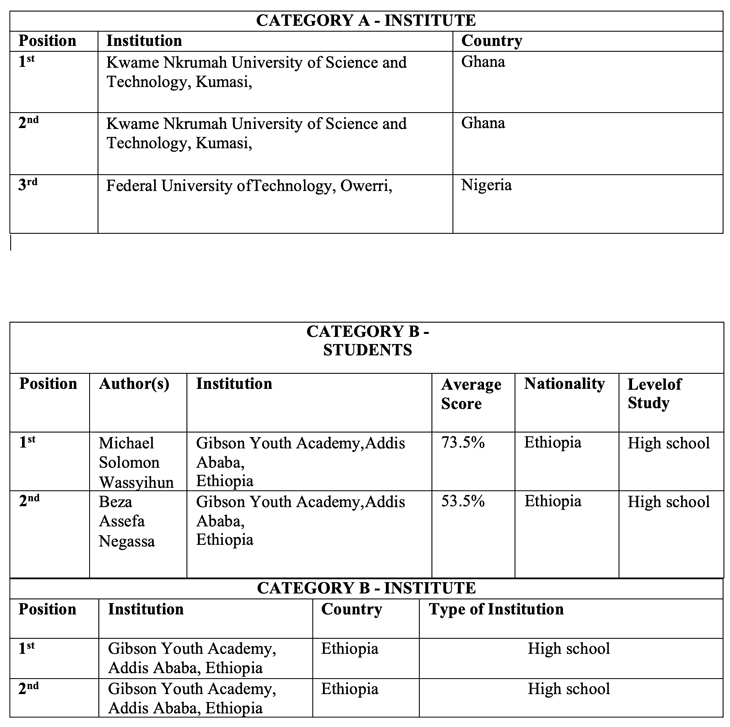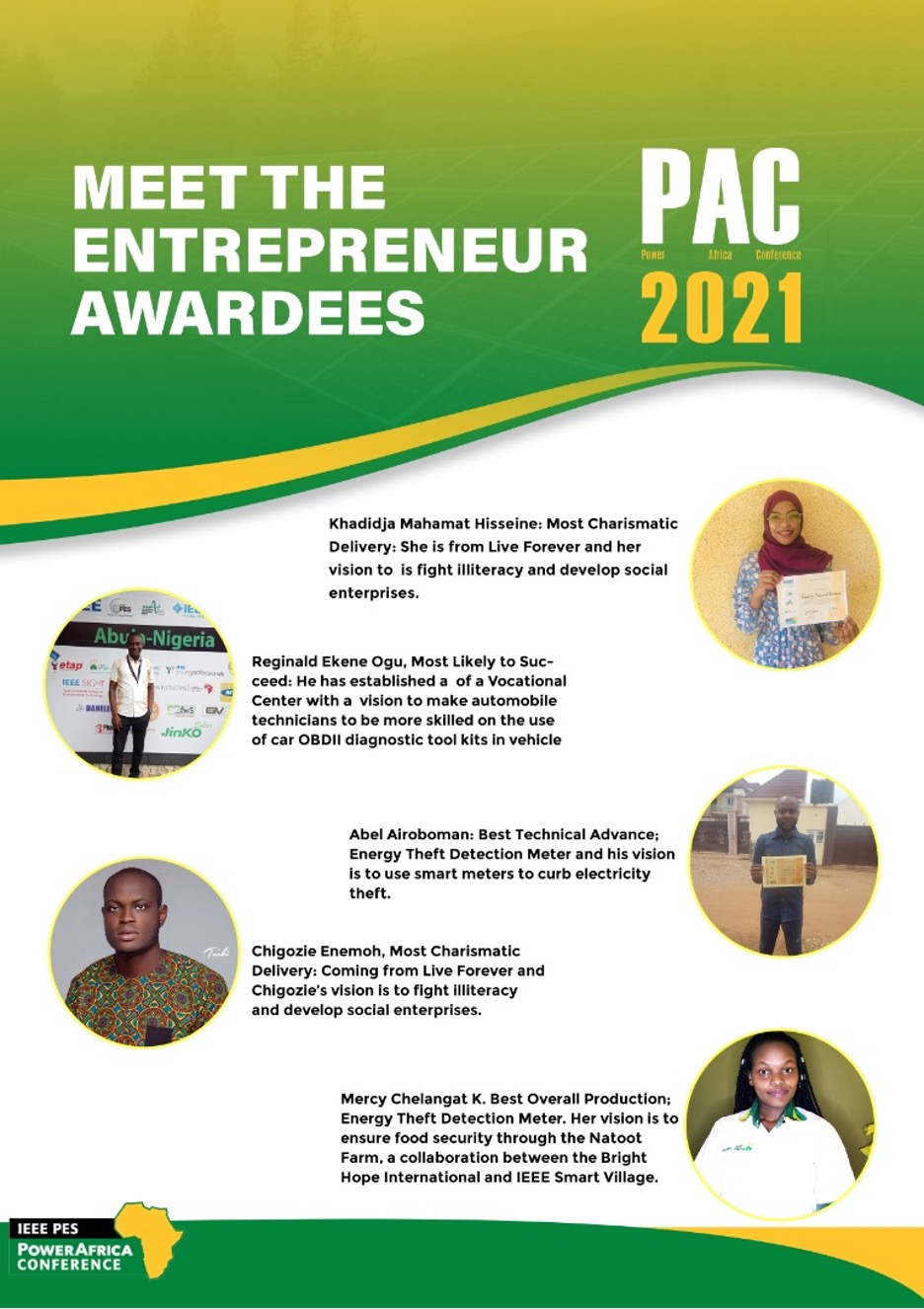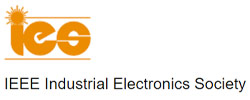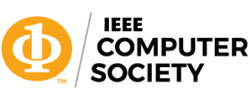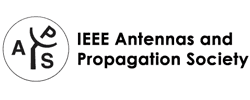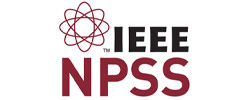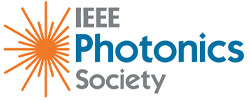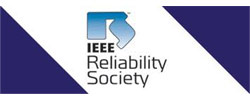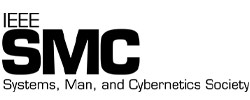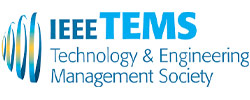EMPOWER: Vol 2. Issue 7 – October 2021
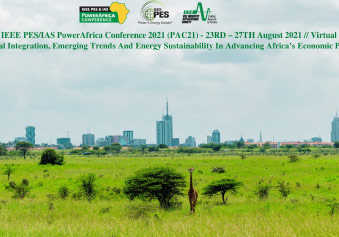
It was an amazing Conference!
The last week of August was nothing but amazing with the IEEE PES and IAS Power Africa conference (PAC) 2021. After several months of planning, the 8th PAC turned out to be another wonderful conference that featured 26 IEEE Smart Villages’ sessions, 9 keynotes addresses from experts around the globe, 5 panel sessions that included young professionals and women in power panels, 5 workshops that includes the humanitarian activities workshop, 4 tutorials and more than 170 technical papers were presented.
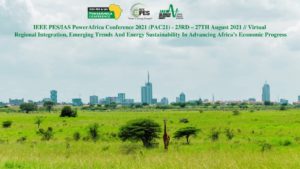
It was indeed a conference to be remembered for a long time, as it was loaded with excellent content presented in an organized fashion. We would like to give special appreciation to the dedicated volunteers and sponsors that supported the conference and made it happen.
The conference had more than 300 registered participants from 52 countries that included representative from the academia, industries, researchers, entrepreneurs, young professionals, students and government officials among others from various regions and diverse groups. This record demonstrates growth of PAC that the next edition will certainly build on.
The conference introduced the virtual networking session this year during the breaks to enable delegates interact more just like the face to face conference, and this platform witnessed more 250 unique users via SPATIAL CHAT. Delegates were able to socialize without having the limitation of not meeting face to face.
This year theme was “Regional Integration, Emerging Trends and Energy Sustainability in Advancing Africa’s Economic Progress,” and the conference witnessed integration of experts with such an exceptional contribution that led to the success of the conference.
More than 50 student participants benefitted from the support student scholarship sponsored by PES and IAS during the conference. The Student Paper content as well as the Meet the Entrepreneur competition were remarkable.
Special appreciation to the organizers, the dedicated volunteers that worked effortlessly to ensure an astounding conference was delivered, the IEEE staff from PES, IAS and MCE team that worked with the host organizers, the sponsors, as well as the leadership of IEEE Smart Village for their respective contributions to an enriched content delivered at the Conference.
The organizers hope to unite again soon in Kigali, Rwanda come 2022. The call for paper will be out for the next edition. For more information about the IEEE PAC 2022 please do reach out to the general chair or co-chair of the conference via brawn@africa.cmu.edu and niyoyitasamantha@gmail.com, respectively.
Article contribution by Abdullateef Aliyu – Africa Working Group Vice Chair
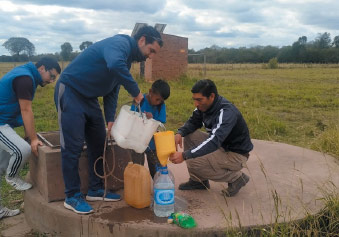
Smart Village progresses strong despite Covid
NPSS Makes Major Contribution
In the first half of 2021, IEEE Smart Village (ISVx) has made impressive progress on a broad front. Here are a few highlights.
New Project Support: President John Nelson is coordinating new project support with several different Societies and IEEE Region 9 for the first new pilot projects in Honduras and Nicaragua. He is also working with 12 IEEE Societies, and one Council Governing Board to help secure additional funding for the list of over 20 proposals in hand totaling US$2.5 million for an expanding life of applicants.
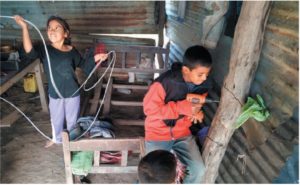
Chaco – Argentina, new concrete cistern for water system
India Projects: Vice President Rajan Kapur is spearheading several India projects including the new EV (Electric Vehicle) charging station that NPSS contributed toward in March 2021, located in close proximity to a major Cupertino Rotary EV project in the same region of the Himalayas.
India Working Group: Sanjay Patki, the new Chair of SAWG, the Southeast Asia Working Group, has built a strong team to push the growing list of approved projects, including the NPSS funded 6-Villages project that has been seriously delayed by COVID. However, the first of six sub-projects has been submitted for ISV approval and hopefully the pandemic will abate for quicker progress in the near future. These are joint projects with the WHEELS Global Foundation of India Institute of Technology with whom ISV has an MOU.
VP Rajan is also assisting with managing the joint ISV-Rotary Telehealth projects in Uganda and Kenya; other key players are Jack Higgins, MD, President of Global Telehealth Network, and Jude Numfor of REIc Cameroon providing SunBlazer electricity, Internet connectivity and technical teams training to sustain the projects. Ray and Albe Larsen of the ISV Advisory subcommittee are also on the team. IEEE donors contributed critical matching funds for both pilots. The Uganda project is fully approved and well underway with a Rotary Global Grant and various Rotary Clubs providing 75% of the funding, while the Kenya project awaits an expected final signoff in the new Rotary fiscal year which started July 1, 2021. Both projects have experienced on-the-ground Rotary teams involved in developing and managing Rotary Global Grants.
Recent NPSS Approval of Zambia and Argentina Initiatives: At the June NPSS AdCom and FinCom meetings, two initiatives, which should have major impact in very poor areas were approved and work to complete the ISV onboarding process, are underway. The Zambia program is expected to bring electricity, clean water and education via connectivity to a permanent Refugee Camp managed by the UNHCR for many years; the main business opportunities are improved agricultural production, access to markets, electricity to replace diesel power and developing new businesses at the community level, all of which will be models to scale the pilot in future to benefit a million people. The Argentina project has similar goals for an area suffering severe deforestation due to often illegal logging activities by large industrial interests. In both cases, the major goals greatly improved economic and health benefits scalable to many more areas.

Chaco Argentina – Volunteers installing lighting in typical home
Expanded Working Groups Stimulate Growth of Opportunities: Led by Vice President Robin Podmore and President John Nelson, new Working Groups have been commissioned beyond the SAWG mentioned above, notably in Africa, Latin America, North America, Southeast Asia/south Pacific and a China Working Group in the development stage. The tasks of a Working Group are to help identify candidate ISV entrepreneurs, assist with the work of startup proposals, and help raise the needed seed funds. They will also help evaluate new proposals before sending to ISV for final approval.
The Africa Working Group has 180 members, 40% of whom are women. The group aims to have a member in all 54 countries in Africa. Latin America has 50 members and is focusing strongly on student development and assisting ongoing projects in Galapagos, Ecuador and the new one in Chaco, Argentina.
The North America WG is very new but growing rapidly in bringing together many new partners devoted to improving livelihoods in indigenous native populations as well as minority owned businesses, the latter with a new partner just awarded special development funding from the U.S. Department of Energy, who consider ISV to be a major player in this broad program. Another strong partner is the University of Calgary, Alberta which has an education program for indigenous entrepreneurs that can lead to a natural partnership with ISV.
Other partners have come forth who are developing ISV-like programs for the Navajo Nation, 20% of whom have no electricity or clean water (~36,000 people) in villages in very remote areas; in addition, they need to build commerce in their own towns and areas to not have to travel to cities for all their simplest needs. A team is rapidly forming with highly qualified members from many countries.
Student Branches Introduced: Working Groups are also instrumental in establishing Student Branches of ISV; the first was recently established at the University of Johannesburg in South Africa. Student branches are seen as instrumental in drawing future volunteers and leaders into ISV.
In summary, despite the pandemic ISV continues to progress especially in new teambuilding on a broad front. The new connection with Rotary through Silicon Valley Smart Village e-Club, with ISV VP and Co-founder Robin Podmore serving as its first President, now entering its second year. In our inaugural joint project in Uganda and Kenya our funds were leveraged by a factor of 3, as we are becoming recognized as a trailblazer. This project is now being leveraged again to seek a $2M grant from Rotary Foundation, separate from Rotary International which funds the Global Grants we have received thus far. None of this would have been possible but for NPSS contributions and moral support over the past decade.
NPSS leadership and management continues to receive ISV’s highest praise and gratitude for its outstanding unflagging support.
This article was contributed by NPSS and all credit goes to them.
Ray Larsen
NPSS Liaison for Humanitarian Projects Chair, ISV Advisory and History Committee
PAC 2021 a Success
The 8th edition of the IEEE PES IAS PowerAfrica Conference (PAC) took place successfully between the 23rd and 27th of August 2021. PAC is usually sponsored by the IEEE Power and Energy Society (PES) and Industrial Applications Society (IAS) and this year it was themed “Regional Integration, Emerging Trends and Energy Sustainability in Advancing Africa’s Economic Progress”. The PAC2021 was hosted virtually by the IEEE Kenya Section.
Previous editions of the conference have been held in Johannesburg, South Africa (’07 and ’12), Livingston, Zambia (’16), Accra, Ghana (‘2017), Cape Town, South Africa (’18), Abuja, Nigeria (’19) and virtually (’20), hosted by the Kenya Section.
This year’s conference incorporated the following key activities:
- 8 Keynotes
- 3 Workshops
- 5 Industry Tutorials
- 4 Industry Panel Sessions
- 27 Smart Village Sessions
- 170 Technical Paper Presentations
PowerAfrica Conference garnered a lot of support from the industry and academia, with the following Kenya institutional partners coming onboard.
The Engineers Board of Kenya (EBK) has the overall mandate of developing and regulating engineering practice in Kenya. PAC2021 awarded 18 Professional Development Units to engineers registered with EBK who attended the conference.
Kenya’s Energy and Petroleum Regulatory Authority (EPRA), who were silver sponsors, shared their Energy Regulations (2021) framework aimed at spurring investment in mini-grid solutions and accelerating universal access to electricity in the country – and seeking input from industry stakeholders. Developed under the provisions of the country’s Energy Act (2019), the Energy Regulations (2021) framework aims to provide best practices for mini-grid tariff approval, licensing requirements, guidelines for operations performance and reporting requirements and supports the country’s aspiration of achieving universal access to electricity by 2022.
Furthermore, the Ministry of Energy and Petroleum (MoEP), Kenya came on board which has a mandate to generate policies that are designed to create an enabling environment for efficient operation and growth of the sector. It sets the strategic direction for the growth of the sector and provides a long-term vision for all sector players.
Kenya Private Sector Alliance (KEPSA) is the private sector apex and umbrella body set up in 2003, to bring together business community in a single voice to engage and influence public policy for an enabling business environment. The alliance endorsed PAC2021.
In addition, the conference would not been a success with the amazing support from IEEE organizational units including:
IEEE Smart Village (ISV), which aims to empower off grid communities with clean energy, education and enterprise development, had several exciting sessions at the conference. These included Student Paper Contest Awards, Meet the Entrepreneur competition, New Talents Program and Energy Entrepreneurs field reports among the 27 sessions.
IEEE Young Professionals (IYP) encompasses members from recent university graduates to experienced professionals and entrepreneurs. YP members are interested in elevating their professional image, expanding their global network, connecting with peers locally and giving back to their community.
The IEEE Women in Engineering is a global network of IEEE members and volunteers dedicated to promoting women engineers and scientists, and inspiring girls around the world to follow their academic interests in a career in engineering and science.
IEEE Humanitarian Activities Committee provides a suite of resources that inspire and enable IEEE volunteers around the world to carry out and support impactful humanitarian technology and sustainable development activities at the local level.
IEEE Africa Council, approved by the MGA Board in June 2018 plays a major step toward the long-term stability and sustainability of IEEE’s support of African engineers. The Council includes all African Sections and Subsections that wish to participate and will ultimately become the focus for much of IEEE’s engagement on the continent.
OMICRON MEA came in as the marketing sponsors for the conference. OMICRON is an international company serving the electrical power industry with innovative testing, monitoring and diagnostic solutions. The application of OMICRON products allows users to assess the condition of the primary and secondary equipment on their systems with complete confidence.
IEEE Standards Association was a silver sponsor and supported the Executive Forum. IEEE Standards Association (IEEE SA) provides a neutral and open environment that empowers innovators – across borders and disciplines – to develop standards and solutions that shape and improve technology for the benefit of industry, society and humanity.
Under the Silver sponsors were NEI Engineering and IncSys. NEI maintains a cross-disciplinary, big-picture perspective while having intimate knowledge of the details when it comes to development, design, construction, and O&M of electrical power infrastructure.
IncSys and PowerData continue to champion the development and implementation of simulation-based solutions for Power System Operators. The industry leading Power Simulator gives all transmission operators, balancing authorities, reliability coordinators and generator operators affordable access to their own power system model for use in world-class simulations.
ETAP, who came in as gold sponsors, are the global market and technology leader in modeling, design, analysis, optimization, monitoring, control, and automation software for electrical power systems.
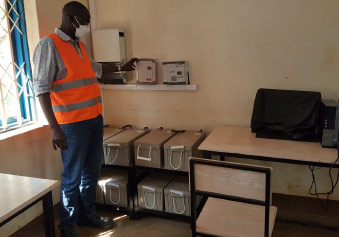
Improving Health, Sanitation, and Economic Conditions of Kawolo, Kyangwali and Kiyindi in Uganda
IEEE Smart Village, The Global Telehealth Network (GTN), Local and international Rotary Clubs and the Buganda Kingdom came together to collaborate to improve access to healthcare in medically underserved areas while improving education and economic development. The immediate focus is to response to the global pandemic of COVID-19 and improve in maternal and child health services through six pilot projects in East Africa. The long-term objective of the project is to progress toward eradicating poverty in line with United Nations Sustainable Development Goals (SDG) number one.
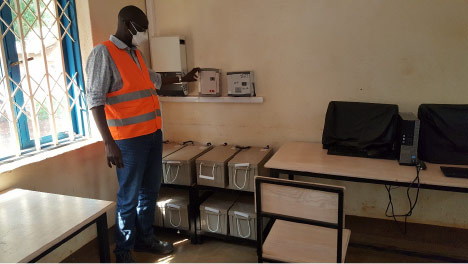
Telehealth center in Uganda
Healthcare infrastructure in parts of the developing world was crumbling even before the COVID-19 virus which made its presence at the end of 2019 in Wuhan, China. This quickly became a global pandemic declared by the World Health Organization (W.H.O.) in early 2020. However, this pandemic not only crippled the economies of various countries, but also the overall wellbeing of communities around the globe. The developing economies have been hit hard even though they were already facing their own challenges such as lack of access to clean water; inadequate sanitation & hygiene; hunger; starvation; poor healthcare system; and the digital divide.
COVID-19 exacerbated the social system in Uganda: the rapid population growth and the government’s policy of accommodating all refugees is now further over-stretching the existing systems. This is especially true for rural communities where many people live with little or no access to basic healthcare services. The most common reasons for this are a result of inadequate services including shortage of medical doctors, few nurses, weak training and educational systems of healthcare workers, and increased diseases burdening the healthcare system, the underlying factors of which are lack of safe water, sanitation and hygiene.
It is because of these reasons that organizations such as IEEE Smart Village, The Global Telehealth Network (GTN), local and international Rotary Clubs and the Buganda Kingdom came together to collaborate to improve access to healthcare in medically underserved areas while improving education and economic development. The immediate focus is to respond to the global pandemic of COVID-19 and improve maternal and child health services through six pilot projects in East Africa. The long-term objective of the project is to progress towards eradicating poverty in line with United Nations Sustainable Development Goals (SDG) number 1.
Beneficiaries of the project are residents of multiple communities in Uganda that lie within the catchment areas of three facilities, and all of them will enjoy better health as a result of these project. The following partners were selected through an extensive community assessment process:
Kawolo General Hospital (hub) in Lugazi is a regional hospital, 50 kilometers from the capital on the main highway to Mombasa, Kenya. It serves 450,000 people plus trauma victims and patients transiting on the busy highway. This site covers other healthcare centers such as Busabaga, Najjembe, and Nyenga Mission Hospitals.
The Kiyindi Landing site lies on Lake Victoria in Buyikwe district, Uganda, and has an estimated population of 130,000. This impoverished community subsists on fishing and associated trades. Access to healthcare is limited, and the situation is exacerbated by high mobility, prostitution etc.
The last site, the Kyangwali Refugee Settlement in Kikuube district Uganda, has seen its population grow to 120,000 since it was established in the 1960s. It shares basic healthcare, schooling etc. with a surrounding community of 90,000.
The telehealth project will encompass a number of benefits such as:
- Doctors improving their skills and sharing experiences with others through online platforms for professional development.
- Local nurses will have an opportunity to interact with more medical personnel around the world.
- Patients will get immediate team attention under any circumstances with the 24/7 network while reducing transport and power costs for hospitals and healthcare.
- The community will benefit through improved sanitation and managing of COVID-19.
Article by Vincent Olema
Volunteer with ISVx Africa Working Group & IEEE Uganda Section
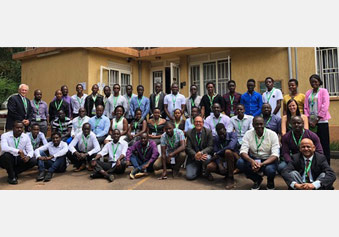
A recap of the IEEE Smart Village “Spotlight” event
In-country energy entrepreneurs and volunteers from IEEE Smart Village shared their expertise and insight with 154 participants during a virtual event, held on August 26, 2021 and hosted by the IEEE Foundation. The recorded video of Spotlight is available on the IEEE Foundation Vimeo Channel.
IEEE Smart Village provides a comprehensive solution combining renewable energy, community-based education, and entrepreneurial opportunities and IEEE Smart Village donors power those efforts. We are grateful to our many donors who recognize the good work IEEE Smart Village volunteers are making. If you have not made your contribution for 2021, you can do so via the safe and secure web portal https://www.ieeefoundation.org/SmartVillage_donation.
Likewise, please connect us with your company (corporate social responsibility) managers to pursue employee engagement in meaningful IEEE Smart Village projects that establish sustainable electrification for homes and micro-businesses; provide technical training and mentorship for local entrepreneurs; as well as enhance community education, and women empowerment initiatives by contacting smartvillagestaff@ieee.org.
Important links you don’t want to miss!
- Not an IEEE Member? How to join IEEE https://www.ieee.org/membership/join/index.html
- Click here to learn more about IEEE membership and special discounts for developing nations and low-income economies – https://www.ieee.org/membership/join/emember-countries.html
- For more information about discounts for societies, check in the following link: https://www.ieee.org/communities/societies/index.html
- Learn more about ISVx at PowerAfrica Conference – https://ieee-powerafrica.org/isvx/
